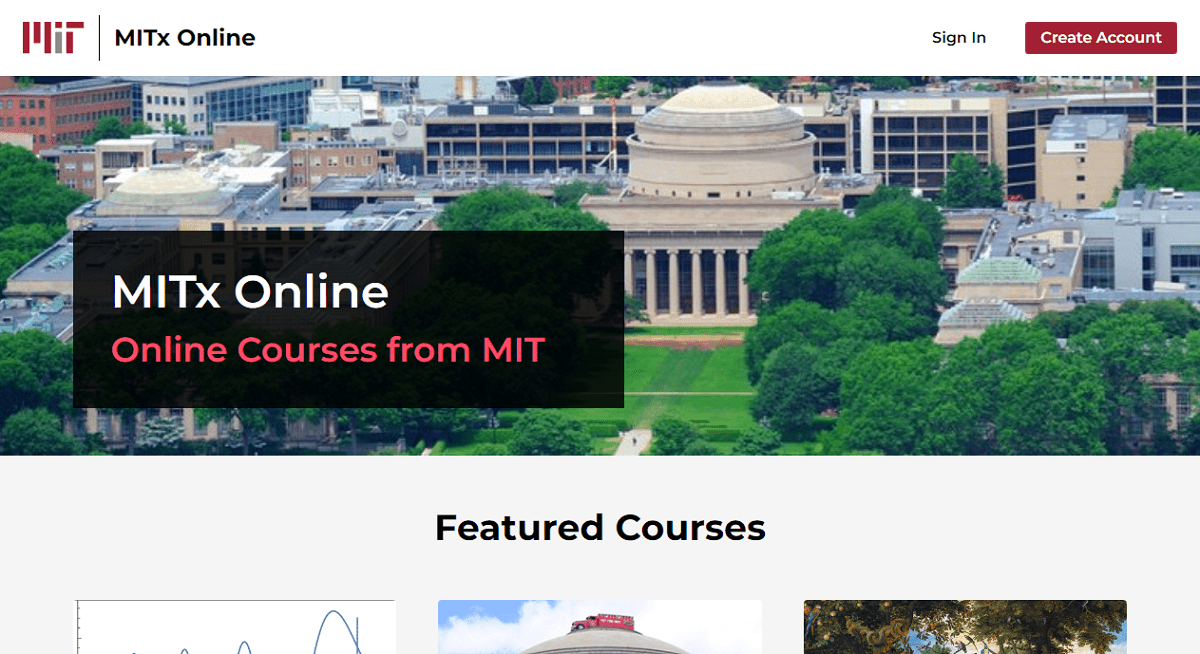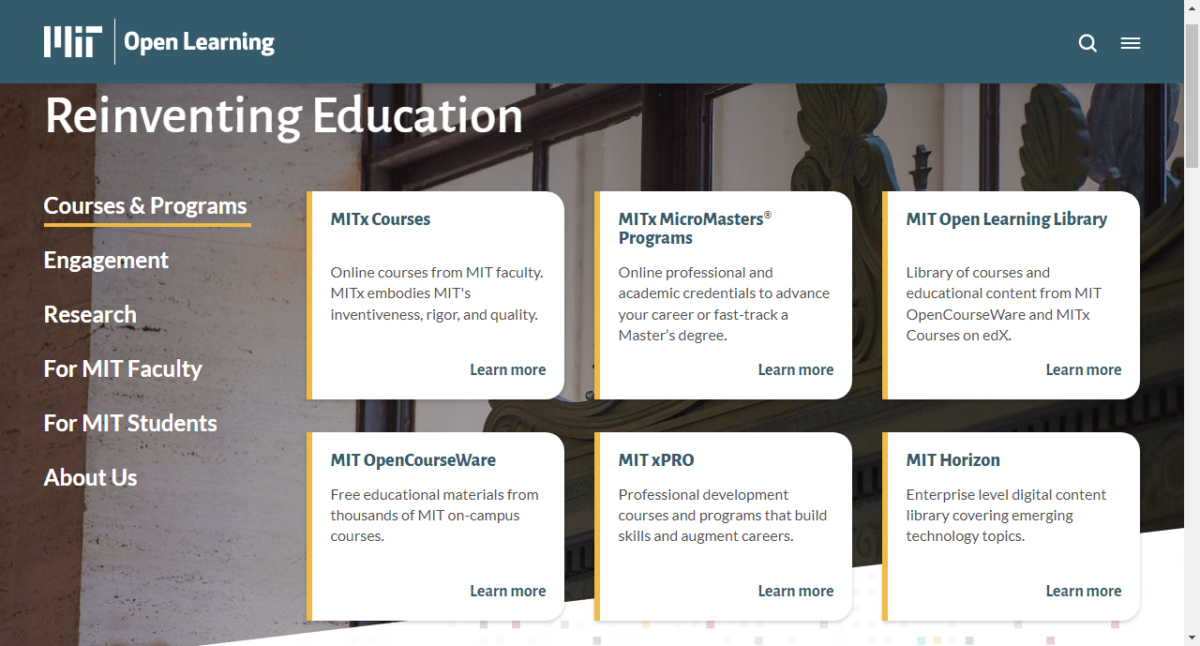13 Free Online Courses at MIT in 2023
Without a doubt, the Massachusetts Institute of Technology is at the top of our list of the most esteemed colleges in both the United States and the rest of the globe. It is not the most accessible college, though, given how selective this university is with admissions and the high cost of tuition. You will find this post about free online courses at MIT to be quite informative for this reason.
Free online courses are available from the Massachusetts Institute of Technology in a variety of fields, including anthropology, biological engineering, economics, entrepreneurship, history, material science & engineering, urban studies & planning, physics, mathematics, music studies & arts, and more. All of these excellent courses are taken from the MIT curriculum.
You have the opportunity to learn something from one of the most renowned institutions in the world, absolutely free of charge! Continue reading to discover more about the free online courses at MIT
Free Online Courses at MIT
The top online courses offered by the Massachusetts Institute of Technology are listed below. For further information, take a look at MIT OpenCourseWare, MIT Open Learning platform, and the 200+ courses offered through edX, which range from social policy to computer science.
Anthropology Courses
The department of anthropology’s top course is Qualitative Research Methods: Interview Process. This quick course is an adaptation of a semester-long graduate-level course on qualitative research methods taught at MIT. This online course will explicitly cover how to set up and carry out a conversational interview in order to obtain data.
Additionally, they will go through the technique of qualitative research, how it relates to other types of research, and how qualitative and quantitative research work best together in a research project. This is the first article of a multi-part series on conversational interviewing, data analysis, and creating a theory that will be published over the course of the upcoming year.
Biological Engineering Courses
A fresh surge of interest in cells as therapeutics has been sparked by the success of CAR-T cell therapies, which have been fueled by their exceptional efficacy and recent regulatory approvals. However, manufacturing serves as the bridge between an innovative new discovery made in the lab and a commercial medication that is made available to patients who need it.
Basic cellular biology, genetic modification, analytical methods, how the characteristics of cell therapies influence manufacturing, delivery, and supply chain decisions, and how drug regulations are applied specifically to cellular therapies are some of the topics covered in a self-paced,9-week course titled “Making a Cell Therapy: Principles and Practice of Manufacturing” as it introduces learners to this new field.
Biology Courses
This is the first lesson of a multi-part series on genetics. These genetics courses reach a new level of detail by building on the ideas from biochemistry, genetics, and molecular biology from the 7.00x Introductory Biology MOOC. How did we come to understand what we do about heredity, and how do we plan studies to test genetic theories?
How do we research how various qualities are passed down? How does that knowledge advance our understanding of hereditary diseases? You’ll be challenged by professors Michael Hemann and Peter Reddien to advance your fundamental understanding of genetics in a 4- week self-paced course called Genetics: The Fundamentals. You will investigate the principles of genetics and how to use those ideas to comprehend current investigations of heredity.
After this first course, you can then go on to take part 2 and 3 which talks about Transcription & Transposition, Processing & Translation respectively
Economics Courses
Achieve success on the Microeconomics AP® exam by learning how people and corporations make the choices that shape our economy. If this is your goal the course you need is this one! – AP® Microeconomics

Basic microeconomic principles are introduced in this economics course. You’ll discover how people decide on things like what kind of products to buy and how many hours to work, as well as how businesses decide on things like how many employees to hire and what rates to charge. You will learn how to assess economic results in terms of justice and efficiency, and you’ll also talk about the correct role of the government in setting these outcomes.
The entirety of the content needed to pass the Microeconomics AP® exam will be covered in this course.
History Courses
Are you interested in History, the 19-week course Visualizing Imperialism & the Philippines, 1898-1913? For the purposes of this course, visual records are used to help students comprehend history around the turn of the 20th century. Students will gain navigational skills for using primary visual sources as they look into:
political cartoons’ historical conflicts; racial and prejudice concerns in cartoons and photography; the use of photography as a weapon of force during conquest and colonialism;
The frequently ignored Philippine-American War, ethnographic photography, how the contrast between civilized and barbaric societies seemed to legitimize colonial conflicts and the early application of cross-cultural photography in mass media.
Literature Courses
If you are a fan of novels and Shakespeare then the course Global Shakespeares: Re-Creating the Merchant of Venice might be of value to you. The Merchant of Venice, one of William Shakespeare’s plays that are performed the most frequently around the world, is brought into the twenty-first century in this course by comparing a variety of recent productions, from film and television productions to an international production that was the play’s first showing in the former Jewish Ghetto of Venice, Italy. Learners will:
- Learn to perform Shakespeare and read it
- Examine the historical and modern context of Shakespeare’s works, including the reasons and means by which they are still read and performed today.
- Gain knowledge from experts in Shakespeare, history, theater, and actors.
- Use the information and skills they have learned to create and perform a few scenes.
Management Courses
Product and service development is quickly moving away from the R&D departments of producers and toward innovative users, or potential consumers. Instead of solely depending on internal development, producers must change their approach to locating designs that are commercially viable among user prototypes.
You will study these modern, internet-era invention methods in this interesting course titled “Product and Service Creation in the Internet Age“. It’ll talk about how business executives may identify, leverage, and profit from user-developed innovations in their own projects and businesses. The implications of the upcoming “era of abundant and free invention” will also be covered.
Material Sciences and Engineering Courses
Cellular Solids is one of the top courses in this department. In this 15-week engineering course, you will examine how cellular solids made of polymers, metals, ceramics, glasses, and composites are processed and structured.
You’ll start the course by developing models for the mechanical characteristics of honeycombs and foams, and you’ll learn how their special qualities can be used in things like thermal insulation, energy-absorbing gadgets, and lightweight structural panels.
The use of cellular solids in medicine will then be examined. Specific topics covered include trabecular bone mechanics, the increased risk of bone fracture caused by trabecular bone loss in patients with osteoporosis, the development of metal foam coatings for orthopedic implants, the application of foam models to tissue engineering scaffolds, and the creation of a porous scaffold for tissue engineering that mimics the body’s own extracellular matrix.
Finally, you will look at examples of engineering design influenced by natural materials, including sandwich structures and cellular solids that are found in nature.
Office of Digital Learning Courses
Interested in entrepreneurship but unsure of where to begin? Becoming an Entrepreneur is a program created in collaboration with MIT to help people of all ages and backgrounds navigate the steps involved in starting a business. This course, which has tens of thousands of students enrolled, is as interesting and approachable as it is educational.
Becoming an Entrepreneur will provide you the motivation to consider a career in entrepreneurship as well as the tools you need to get through the difficult first stages of starting a business.
This course adopts LaunchX’s effective strategy for entrepreneurship that makes use of MIT’s Disciplined Entrepreneurship, lean methodologies, and design thinking, from coming up with fresh company ideas and conducting market research to creating and testing your offering and giving a pitch. There will be a mixture of quick movies and tasks that will test you.
Urban Studies and Planning Courses
The COVID-19 pandemic is a perfect example of current weaknesses. Although numerous international and national recommendations have been made, it is still unknown to what degree these purported “best practices” are actually sufficient for the unique difficulties faced by self-organized communities in self-built, urban impoverished settlements. Up to a billion people worldwide are unable to deal with the health crisis through social isolation and frequent handwashing because they lack suitable housing, adequate water, and sanitation infrastructure, or they depend on daily informal revenues.
The goal of this course, COVID-19 in Urban Poor Communities: Response & Challenges, is to help students understand how local and top-down approaches to the COVID-19 pandemic differ from one another. It deals with governance concerns to comprehend the specific politics that control urban poor communities and influence how governments and other development agents react.
Brief lectures and other resources will be used to share the experience of experts from a range of backgrounds, including academics, community leaders, people who live in informal settlements, governmental officials, NGO workers, and others. Students will be able to talk to them and share their experiences with them.
Local and central government employees who work in and with self-organized communities in the Global South would particularly benefit from this course, as will community activists, non-profit advocates, settlement dwellers, and street-level public servants. Their comprehension of the current situation will be improved, and it will help them get ready for any catastrophes in the future.
Physics Courses
This module, Mechanics: Momentum and Energy, which covers calculus-based mechanics, is the second in a series. Along with the potent concept of conservation laws, you will study the ideas of momentum, impulse, energy, and work. You’ll use these ideas as effective strategies to address intriguing mechanics issues like rockets and collisions.
Momentum and Impulse, Continuous Mass Flow, Work, Kinetic Energy, Potential Energy, Mechanical Energy, and Collisions are among the topics you’ll study in this course.
Music and Theatre Arts Courses
You will study many types of musical rhythm in this course, World Music: Global Rhythms. This course does not need you to play an instrument or the ability to read musical notation. You don’t need to be familiar with any advanced musical theory or vocabulary to get started; you will learn all the principles we cover along the way, along with the nomenclature and how it differs around the world.
The course will examine music from all around the world and throughout history, including traditional African music, Balinese Gamelan, classical music from Japan, India, and the West, as well as modern reggaeton and punk. You’ll discover how to identify particular rhythms and trace how they’ve changed over time and around the globe. You’ll discover how to identify particular rhythms and trace how they’ve changed over time and around the globe.

Additionally, you’ll discover how various cultures came up with various forms and conceptions of rhythm, meter, melody, and structure as well as begin to differentiate certain key concepts. Therefore, all you need to succeed in this course is curiosity and the willingness to dive in with both feet, regardless of your level of musical proficiency, whether it be singing in the shower or playing the violin with virtuosity.
Political Science Courses
There is a clear need for informed and educated solutions to the most important public policy concerns as public policies become more complicated and technological in character. However, most researchers lack the skills necessary to communicate with policymakers in an effective manner.
Tools for Academic Engagement in Public Policy, a brief course, will give students a fundamental overview of the U.S. federal government’s role in the policymaking process while outlining concrete steps researchers can take to interact with policy stakeholders and explain the implications of their research for policy. In particular, it will concentrate on
Read Also: Free Online Courses at Stanford
What Is MIT OpenCourseWare?
The Massachusetts Institute of Technology launched MITOpenCourseWare as a project to publish all of the course materials from its undergraduate and graduate-level courses online and make them freely and publicly accessible to anybody, anywhere.
In order to freely share knowledge with students and educators all around the world, MITOpenCourseWare is publishing materials from more than 2,500 MIT courses that span the full MIT curriculum. Users of OCW are not granted credit or certification by MIT, and the university makes no demands in exchange.
OCW items are available for use at any time, with no restrictions. There is no signup process and no beginning or finish date. You can download files as well for later use. Send to acquaintances and coworkers. Modify, adapt, and reuse (just remember to cite OCW as the source.)
Anyone with an internet connection can access more than 2,500 MIT courses through MITOpenCourseWare because the institution has made all of the learning materials from its undergraduate and graduate-level courses freely available online.
See Also: Free Online Courses at Harvard
What Is MITx?
MITx is MIT’s e-learning platform that offers massive, open, online courses (MOOCs) through edX and through MITx Online.
The complete range of MIT’s academic courses, including core STEM courses, humanities & social science studies, and advanced master’s level courses that could facilitate a master’s degree, are covered by MITx courses, which are taken straight from MIT classrooms.
Students from all around the world can sign up for a course of their choice, learn for free, or work toward earning a certificate of completion for a small price. In MITx courses, students engage in interactions through challenges that offer immediate feedback, discussion boards, movies, readings, and tools that help them learn more deeply.
Conclusion
You’ll appreciate the availability of these 13 Free Online Courses at MIT after looking at MIT’s tuition rates. The majority of these courses are self-paced, and if you work hard and consistently, you can finish them quickly. We suggest that you take advantage of this opportunity fully. Best regards!
